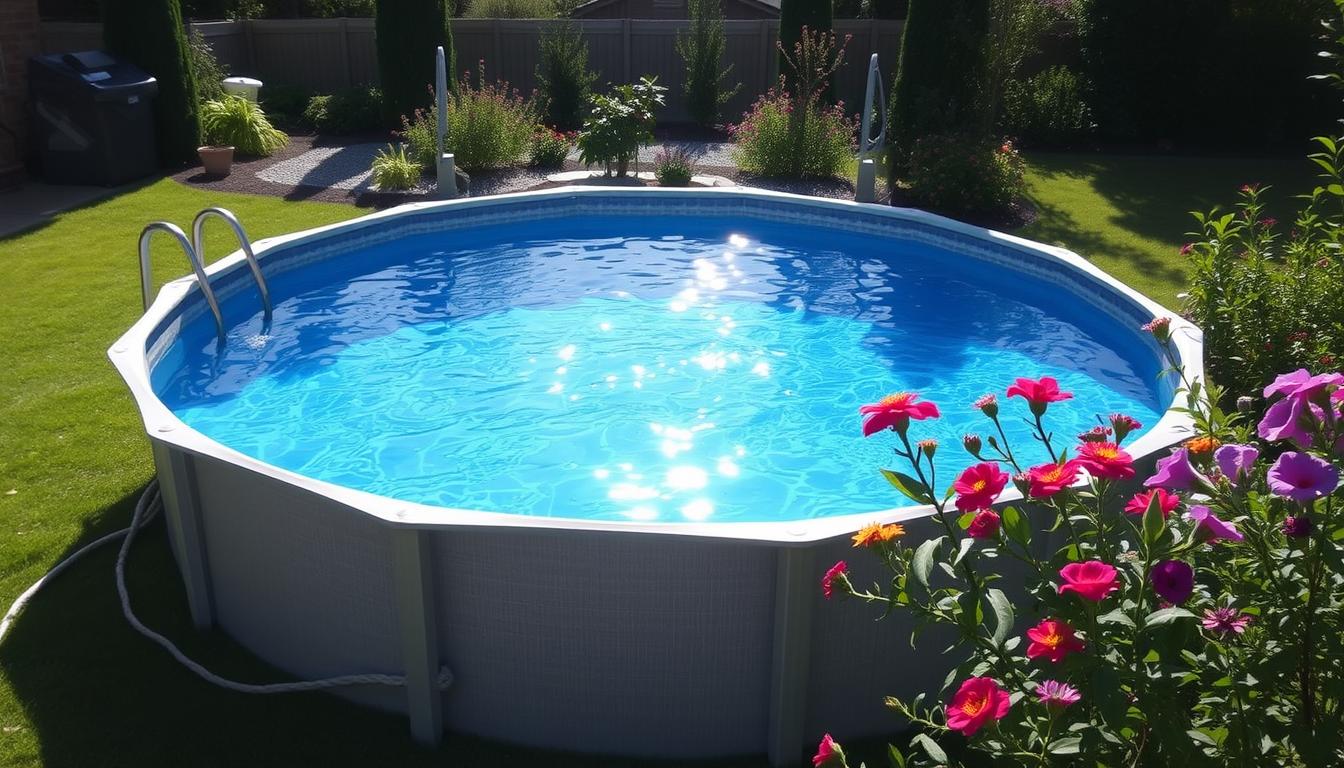
An 18 ft round above ground pool holds about 8,565 gallons of water. A 30 ft round pool can hold approximately 23,793 gallons. This difference shows why knowing your pool’s volume is crucial for proper maintenance.
Understanding your pool’s capacity helps determine chemical treatments and heating efficiency. It also ensures proper filtration cycles. This knowledge creates a safe and inviting swimming environment for everyone.
Pool owners often seek guidance on water requirements and installation. A pool capacity calculator is a valuable tool for estimating water needs. It helps with planning and cost estimation for your specific pool size.
Knowing your pool’s gallon capacity helps optimize maintenance routines. It also aids in maintaining ideal water levels. This knowledge allows you to create memorable moments in your backyard oasis.
Key Takeaways
- Understanding your pool’s gallon capacity is crucial for proper maintenance and enjoyment.
- Pool size and depth significantly impact the volume of water required.
- A pool capacity calculator can help estimate water needs for specific pool dimensions.
- Knowing your pool’s volume aids in determining chemical treatments, heating efficiency, and filtration cycles.
- Proper pool water management ensures a safe and inviting swimming environment.
Understanding the Significance of Pool Gallons
Knowing your above ground pool’s gallon capacity is vital for a perfect backyard oasis. It affects water chemistry, energy efficiency, and overall enjoyment. Understanding pool gallons ensures a safe, clean swimming experience for everyone.
Ensuring a Safe, Clean, and Enjoyable Swimming Experience
Proper water chemistry is key to a healthy pool environment. Your pool’s volume determines the amount of chemicals needed for balance and sanitation. Accurate calculations help you measure and add chemicals precisely, ensuring safe swimming for all.
Knowing your pool’s volume helps determine appropriate filtration cycles for crystal-clear water. Premium above-ground pools often feature large cartridge filter systems. These systems can reduce microns more effectively than sand systems.
Running your filtration system for the right duration optimizes water clarity and hygiene. This creates an inviting oasis for your outdoor living space.
Impact on Maintenance, Treatment, and Memorable Moments
Pool gallon capacity affects energy efficiency and cost-effectiveness. Heating larger water volumes requires more energy, impacting utility bills. Understanding your pool’s volume helps you make informed decisions about water conservation.
You can implement energy-saving measures like solar covers or efficient pool heaters. This saves money and contributes to a more eco-friendly backyard oasis.
Pool size and depth influence how many people can enjoy your outdoor space. Larger pools accommodate more swimmers, creating more memorable moments. Consider local codes and certified lifeguard requirements for a safe experience.
| Pool Depth | Square Feet per Person |
|---|---|
| 5 feet or less | 20 square feet |
| Over 5 feet | 15 square feet |
Understanding pool gallons helps create a safe, clean, and enjoyable backyard oasis. It’s crucial for water chemistry, energy efficiency, and memorable moments. Calculate your pool’s volume to make informed decisions for a fun-filled summer.
Calculating Your Pool’s Gallons
Knowing your above ground pool’s water volume is vital for proper maintenance. It helps ensure a safe, clean swimming environment. Let’s explore how to calculate your pool’s volume based on its shape and size.
Volume Calculation for Round Pools
For circular pools, use this formula: diameter x diameter x average depth x 5.9. To find average depth, add shallow and deep end depths, then divide by two.
For example, an 18 ft pool with 4.5 ft average depth holds about 7,630 gallons. This calculation uses the formula: 18 x 18 x 4.5 x 5.9.
Volume Calculation for Oval Pools
Oval pools use a different formula: length x width x average depth x 5.9. Let’s look at an example.
A 30 ft oval pool, 15 ft wide and 4.5 ft deep, holds about 12,638 gallons. We get this by calculating 30 x 15 x 4.5 x 5.9.
Practical Examples of Pool Sizes and Gallon Capacities
Here are some common pool sizes and their estimated gallon capacities:
– 15-foot round pool, 4 feet deep: 5,310 gallons
– 18-foot round pool, 4.5 feet deep: 7,630 gallons
– 21-foot round pool, 4.5 feet deep: 10,395 gallons
– 24-foot round pool, 4.5 feet deep: 13,593 gallons
– 16′ x 32′ oval pool, 4.5 feet deep: 13,478 gallons
These are approximate values. For accuracy, measure your pool’s specific dimensions.







